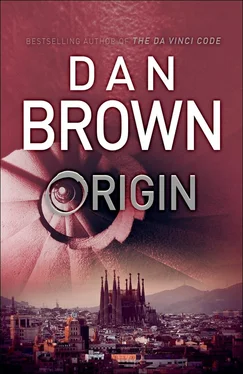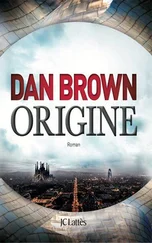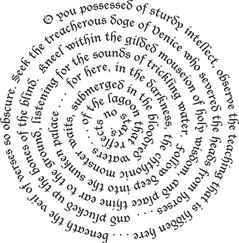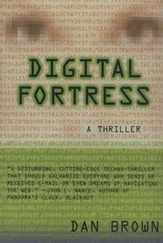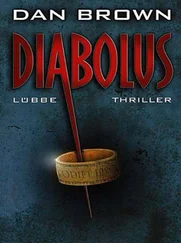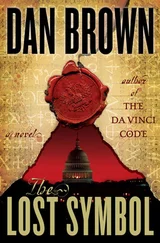“What is it?” Köves pressed.
“We can discuss it later. I’ll phone you again after we witness how Kirsch handles his presentation. Until then, please stay inside. Lock your doors. Speak to nobody. And be safe.”
“You’re worrying me, Antonio.”
“I don’t mean to,” Valdespino replied. “All we can do is wait and see how the world reacts. This is in God’s hands now.”
The breezy meadow inside the Guggenheim Museum had grown quiet after Edmond Kirsch’s voice boomed down from the heavens. Hundreds of guests were reclined on blankets, gazing up into a dazzling sky of stars. Robert Langdon lay near the center of the field, caught up in the growing anticipation.
“Tonight, let us be children again,” Kirsch’s voice continued. “Let us lie out beneath the stars, with our minds wide open to all possibilities.”
Langdon could feel the excitement rippling through the crowd.
“Tonight, let us be like the early explorers,” Kirsch declared, “those who left everything behind and set out across vast oceans... those who first glimpsed a land that had never before been seen... those who fell to their knees in awestruck realization that the world was far greater than their philosophies had dared imagine. Their long-held beliefs about their world disintegrated in the face of new discovery. This will be our mind-set tonight.”
Impressive , Langdon mused, curious if Edmond’s narration was pre-recorded or whether Kirsch himself was backstage somewhere reading from a script.
“My friends” — Edmond’s voice resounded above them — “we have all gathered tonight to hear news of an important discovery. I ask your indulgence in allowing me to set the stage. Tonight, as with all shifts in human philosophy, it is critical we understand the historical context into which a moment like this is born.”
Thunder rolled in the distance, right on cue. Langdon could feel the deep bass from the audio speakers rumbling in his gut.
“To help us get acclimated tonight,” Edmond continued, “we are very fortunate to have with us a celebrated scholar — a legend in the world of symbols, codes, history, religion, and art. He is also a dear friend. Ladies and gentlemen, please welcome Harvard University professor Robert Langdon.”
Langdon jolted up onto his elbows as the crowd clapped enthusiastically and the stars overhead dissolved into a wide-angle shot of a large auditorium packed with people. Onstage, Langdon paced back and forth in his Harris Tweed jacket before a rapt audience.
So this is the role that Edmond mentioned , he thought, settling back uneasily into the grass.
“Early humans,” Langdon lectured on-screen, “had a relationship of wonder with their universe, especially with those phenomena they could not rationally understand. To solve these mysteries, they created a vast pantheon of gods and goddesses to explain anything that was beyond their understanding — thunder, tides, earthquakes, volcanoes, infertility, plagues, even love.”
This is surreal , Langdon thought, lying on his back and staring up at himself.
“For the early Greeks, the ebb and flow of the ocean was attributed to the shifting moods of Poseidon.” On the ceiling, the image of Langdon dissolved, but his voice continued to narrate.
Images of pounding ocean surf materialized, shaking the entire room. Langdon watched in wonder as the crashing waves morphed into a desolate wind-whipped tundra of snowdrifts. From somewhere, a cold wind blew across the meadow.
“The seasonal change to winter,” Langdon’s voice-over continued, “was caused by the planet’s sadness at Persephone’s annual abduction into the underworld.”
Now the air grew warm again, and from out of the frozen landscape, a mountain rose, climbing higher and higher, its peak erupting with sparks, smoke, and lava.
“For the Romans,” Langdon narrated, “volcanoes were believed to be the home of Vulcan — blacksmith to the gods — who worked in a giant forge beneath the mountain, causing flames to spew out of his chimney.”
Langdon smelled a passing whiff of sulfur, and was amazed at how ingeniously Edmond had transformed Langdon’s lecture into a multisensory experience.
The rumbling of the volcano abruptly stopped. In the silence, crickets began chirping again, and a warm grassy breeze blew across the meadow.
“The ancients invented countless gods,” Langdon’s voice explained, “to explain not only the mysteries of their planet, but also the mysteries of their own bodies.”
Overhead, the twinkling constellations of stars reappeared, now superimposed with line drawings of the various gods they represented.
“Infertility was caused by falling out of favor with the goddess Juno. Love was the result of being targeted by Eros. Epidemics were explained as a punishment sent by Apollo.”
New constellations now lit up along with images of new gods.
“If you’ve read my books,” Langdon’s voice continued, “you will have heard me use the term ‘God of the Gaps.’ That is to say, when the ancients experienced gaps in their understanding of the world around them, they filled those gaps with God.”
The sky filled now with a massive collage of paintings and statues depicting dozens of ancient deities.
“Countless gods filled countless gaps,” Langdon said. “And yet, over the centuries, scientific knowledge increased.” A collage of mathematical and technical symbols flooded the sky overhead. “As the gaps in our understanding of the natural world gradually disappeared, our pantheon of gods began to shrink.”
On the ceiling, the image of Poseidon came to the forefront.
“For example, when we learned that the tides were caused by lunar cycles, Poseidon was no longer necessary, and we banished him as a foolish myth of an unenlightened time.”
The image of Poseidon evaporated in a puff of smoke.
“As you know, the same fate befell all the gods — dying off, one by one, as they outlived their relevance to our evolving intellects.”
Overhead, the images of gods began twinkling out, one by one — gods of thunder, earthquakes, plagues, and on and on.
As the number of images dwindled, Langdon added, “But make no mistake about it. These gods did not ‘go gentle into that good night’; it is a messy process for a culture to abandon its deities. Spiritual beliefs are etched deeply on our psyches at a young age by those we love and trust most — our parents, our teachers, our religious leaders. Therefore, any religious shifts occur over generations, and not without great angst, and often bloodshed.”
The sound of clattering swords and shouting now accompanied the gradual disappearance of the gods, whose images winked out one by one. Finally, the image of a single god remained — an iconic wizened face with a flowing white beard.
“Zeus...,” Langdon declared, his voice powerful. “The god of all gods. The most feared and revered of all the pagan deities. Zeus, more than any other god, resisted his own extinction, mounting a violent battle against the dying of his own light, precisely as had the earlier gods Zeus had replaced.”
On the ceiling flashed images of Stonehenge, the Sumerian cuneiform tablets, and the Great Pyramids of Egypt. Then Zeus’s bust returned.
“Zeus’s followers were so resistant to giving up on their god that the conquering faith of Christianity had no choice but to adopt the face of Zeus as the face of their new God.”
On the ceiling, the bearded bust of Zeus dissolved seamlessly into a fresco of an identical bearded face — that of the Christian God as depicted in Michelangelo’s Creation of Adam on the ceiling of the Sistine Chapel.
Читать дальше
